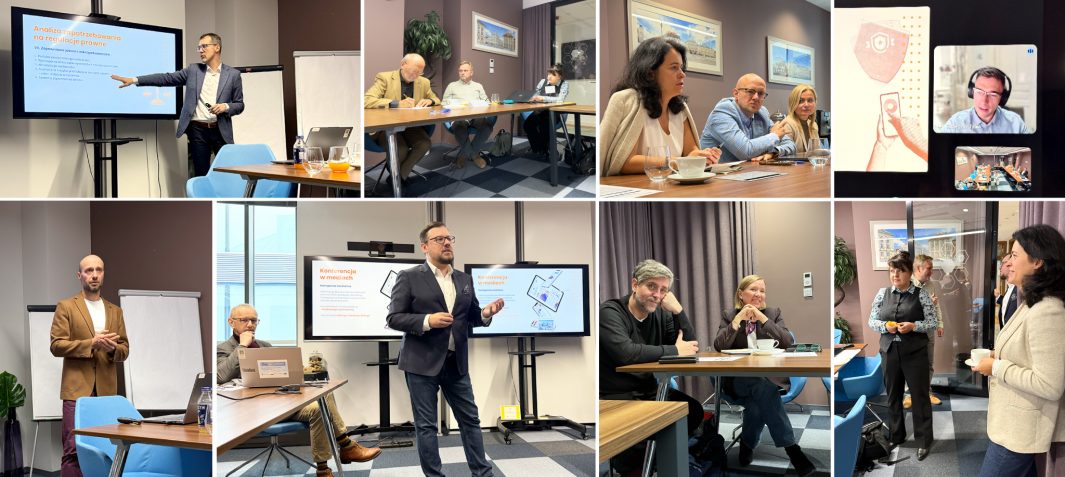
Between regulation and flexibility. Poland’s path towards microcredentials
Does Poland require legislative regulations for microcredentials? If so, how should they be structured, and who should be responsible for creating them? These were some of the key questions discussed by members of the Microcredentials Advisory Group during their latest meeting.
On 6 October 2025, the Advisory Group met in Warsaw for its seventh session, this time focusing on the legal aspects of implementing microcredentials in Poland.
Legal issues are often among the most complex, and microcredentials are no exception.
‘That’s why the discussion should start with the question of whether legal regulations are actually necessary in Poland,’ said Michał Nowakowski, project leader for microcredentials at the Educational Research Institute – National Research Institute.
Odznaka+ app facing strategic decisions
The discussion on legal frameworks was preceded by a presentation from Grzegorz Tylek, product owner of the Odznaka+ application, who updated the members of the Advisory Group on the progress in the platform’s development.
Grzegorz Tylek also outlined plans for the next stages, both in the ongoing pilot and in the longer term. The future of Odznaka+ and the surrounding system will be heavily influenced by EU regulations, which Poland must comply with. Participants also discussed plans to integrate the application with a personal identification number (PESEL) and to ensure its compatibility with the European mObywatel / EDC wallet, based on the Verifiable Credentials standard.
Microcredentials – how to regulate without overregulating?
The debate on the implications of EU regulations for Poland’s digital credentialing system introduced the key focus of the session – the legal side of microcredentials.
During the meeting, Dr Sławomir Szymczak from the Educational Research Institute – National Research Institute (IBE-PIB) analysed the examples of microcredential systems and associated legal frameworks in various nations.
‘Implementing microcredentials based on the 2022 EU Council Recommendation is a great starting point. However, it is worth examining the experiences of other countries – from the strongly regulated systems in New Zealand and Estonia to the very flexible microcredential market in the United States. As a result, it may turn out that intermediate solutions, such as Croatia’s Adult Education Act, Spain’s dual approach for higher education and vocational training, Australia’s National Microcredentials Framework, or similar non-binding guidelines adopted in some Canadian provinces, could offer the most valuable inspiration for developing Poland’s national microcredential system,’ said Dr Sławomir Szymczak, leading microcredentials expert at IBE-PIB.
An important contribution to the discussion came from Szymon Kurek of the Polish Agency for Enterprise Development (PARP), who pointed out that rather than asking whether microcredential regulations are needed in Poland – as they will inevitably appear sooner or later – the real question is how they should be formulated to avoid the risk of over-regulation.
‘If the legal requirements are too detailed and leave little room for interpretation, it will be much harder to make changes and adapt to market needs,’ warned Szymon Kurek.
According to Michał Nowakowski, the project leader for microcredentials, this is indeed a key issue.
‘Poland is in a unique position – decisions on the shape of future regulations can be made based on the recommendations drawn from the national microcredential pilot currently being carried out at IBE-PIB.’
‘Any approach to the legal regulation of microcredentials, or the absence thereof, has its pros and cons. It is worth remembering, however, that in some countries where such regulations exist, very few microcredentials are actually available, and the system simply does not function. In our project, we’ve taken a different approach: we build the solution first, test it in practice, and develop a portfolio of microcredentials. Any future legal framework will come later, complementing a system that is already proven and operational,’ emphasised Michał Nowakowski.
Participants of the meeting included:
Bogusław Dębski, Polish Information Processing Society – Sectoral Council for ICT Competences
Prof. Andrzej Kraśniewski, Conference of Rectors of Academic Schools in Poland
Szymon Kurek, Polish Agency for Enterprise Development (PARP)
Agnieszka Majcher-Teleon, Ministry of Family, Labour and Social Policy
Aleksandra Wąsik, All-Poland Alliance of Trade Unions / Polish Teachers’ Union
Agnieszka Dec, Ministry of Development Funds and Regional Policy
Marek Michajłowicz, National Information Processing Institute – National Research Institute
